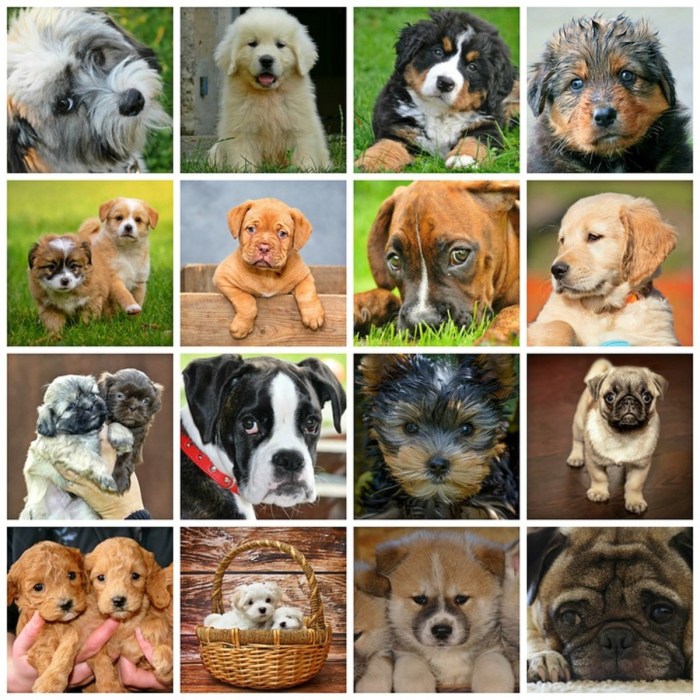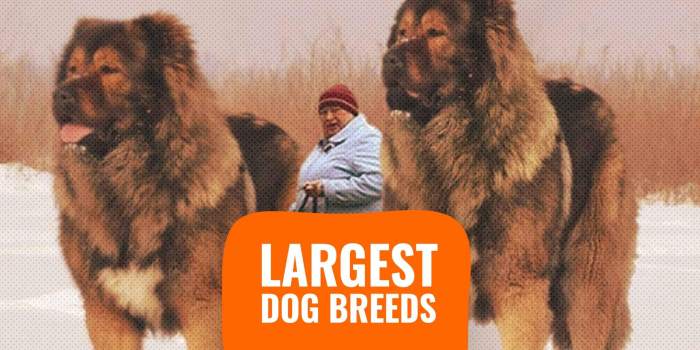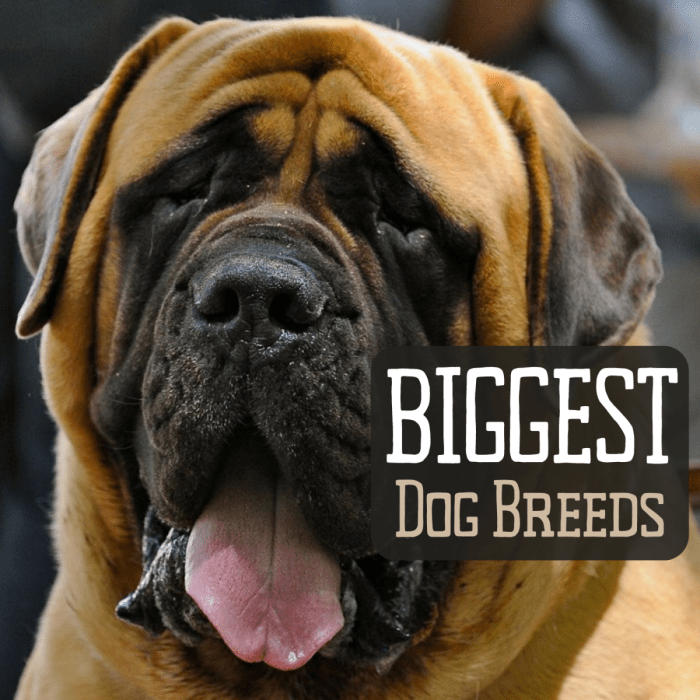As you have a column of dog breeds takes center stage, this opening passage beckons readers into a world crafted with good knowledge, ensuring a reading experience that is both absorbing and distinctly original. The content of the second paragraph provides descriptive and clear information about the topic.
Dog Breed Characteristics

Dog breeds exhibit a remarkable diversity in physical and behavioral traits, each with its unique characteristics that distinguish it from others. These variations are shaped by a complex interplay of genetic, environmental, and selective breeding factors.
Factors Contributing to Breed Diversity
Genetics:The genetic makeup of a dog breed determines its inherited traits, including physical appearance, size, coat type, and temperament. Different breeds have distinct genetic profiles that contribute to their unique characteristics.
Environment:Environmental factors, such as climate, diet, and training, can influence the development and expression of certain traits within a breed. For example, dogs raised in cold climates may develop thicker coats, while those in warmer climates may have shorter, lighter coats.
Selective Breeding:Humans have selectively bred dogs for centuries to enhance desired traits and create specific breeds. This process involves breeding dogs with similar characteristics and selecting offspring that possess the desired qualities. Over time, selective breeding has led to the development of distinct dog breeds with unique traits.
Comparison of Dog Breed Characteristics
The following table provides a comparison of the characteristics of different dog breeds, highlighting their physical and behavioral attributes:
| Breed | Physical Characteristics | Temperament | Lifespan |
|---|---|---|---|
| Golden Retriever | Medium-large size, long golden coat, friendly and playful | 10-12 years | |
| German Shepherd | Large size, black and tan coat, intelligent and loyal | 9-13 years | |
| Poodle | Small to large size, curly coat, hypoallergenic | 10-18 years | |
| Pug | Small size, wrinkled face, playful and affectionate | 12-15 years |
Dog Breed History and Origins

The domestication of dogs began thousands of years ago, marking the genesis of dog breeds. Over time, distinct breeds emerged, each with unique characteristics influenced by their geographical origins and human interaction.
The geographical origins of dog breeds are diverse, reflecting the influence of local cultures and environments. For instance, the Siberian Husky originated in northeastern Asia, adapted to cold climates and sledding tasks. In contrast, the Chihuahua, a small breed, originated in Mexico and was bred for companionship.
Selective Breeding
Selective breeding played a pivotal role in the development of dog breeds. Humans selectively bred dogs for specific traits, such as hunting, herding, or companionship. This practice led to the emergence of breeds with specialized abilities, such as the Labrador Retriever, renowned for its retrieving skills, and the German Shepherd, known for its versatility in herding, tracking, and protection.
Historical Roles, You have a column of dog breeds
Throughout history, different dog breeds have been utilized for various purposes. For example, the Mastiff, a large and powerful breed, was employed as a guardian and war dog. The Greyhound, known for its speed and agility, was used for coursing and racing.
The Beagle, with its keen sense of smell, was employed for hunting.
The evolution of dog breeds is a testament to the enduring relationship between humans and dogs. From their early domestication to their modern-day roles, dogs have played a significant role in human history and continue to enrich our lives as loyal companions and valued members of our families.
Dog Breed Health and Care
Maintaining the health and well-being of a dog requires responsible care and attention to breed-specific needs. Different breeds possess varying genetic predispositions to certain health conditions, emphasizing the significance of tailored preventative care.
Regular veterinary checkups are crucial for early detection and management of potential health issues. Vaccinations safeguard against infectious diseases, while proper nutrition provides essential nutrients for optimal growth and development.
Breed-Specific Health Concerns and Care Practices
- Golden Retrievers:Prone to hip dysplasia, elbow dysplasia, and certain types of cancer; recommend regular orthopedic exams and screening for cancer.
- German Shepherds:Susceptible to hip dysplasia, elbow dysplasia, and degenerative myelopathy; require diligent monitoring for joint health and neurological function.
- Poodles:May develop Addison’s disease, Cushing’s syndrome, and bloat; necessitate regular endocrine testing and precautions to prevent gastric torsion.
- Beagles:Known for obesity, intervertebral disc disease, and glaucoma; require weight management, spinal health assessments, and regular eye exams.
- Bulldogs:Prone to respiratory issues, skin infections, and hip dysplasia; necessitate special care during hot weather, regular skin hygiene, and orthopedic monitoring.
Dog Breed Temperament and Behavior: You Have A Column Of Dog Breeds

The temperament and behavior of dogs vary greatly among breeds. Some breeds are known for their friendly and playful nature, while others may be more reserved or protective. Several factors influence a dog’s personality, including genetics, socialization, and training.
Genetics
Genetics play a significant role in determining a dog’s temperament. Certain breeds have been selectively bred over generations for specific traits, such as herding, hunting, or companionship. These traits are often reflected in the dog’s personality and behavior.
Socialization
Socialization is essential for developing a well-adjusted dog. Puppies who are exposed to various people, places, and experiences are more likely to be friendly and confident as adults. Socialization should begin early in a puppy’s life and continue throughout adulthood.
Training
Training is another important factor that influences a dog’s behavior. Dogs who are properly trained are more likely to be obedient and well-behaved. Training should be consistent, positive, and tailored to the individual dog’s needs.
Matching Breed to Lifestyle
When choosing a dog, it is important to consider your lifestyle and family situation. Some breeds are better suited for active families with children, while others may be more appropriate for quieter households with adults. By carefully matching the breed to your lifestyle, you can increase the likelihood of a happy and fulfilling relationship with your canine companion.
Dog Breed Training and Socialization

Training and socialization are crucial for dogs of all breeds, regardless of their size, temperament, or behavior. Proper training provides dogs with the skills and knowledge necessary to live harmoniously with humans and other animals, while socialization helps them develop into well-adjusted and well-behaved members of society.
Training techniques should be tailored to the specific breed’s temperament and behavior. For example, breeds known for their independence and stubbornness may require more patience and positive reinforcement during training, while breeds known for their eagerness to please may respond well to clicker training or other reward-based methods.
Importance of Socialization
Socialization plays a vital role in developing well-adjusted and well-behaved dogs. By exposing dogs to a variety of people, animals, and environments, they learn to interact appropriately with others and to cope with different situations. Socialization also helps prevent fear and aggression, which can lead to behavioral problems later in life.
Question Bank
What are the key factors that contribute to breed diversity?
Genetics, environment, and selective breeding are the key factors that contribute to breed diversity.
What is the importance of regular veterinary checkups for dogs?
Regular veterinary checkups are important for maintaining dog health, as they allow veterinarians to detect and treat health issues early on.
How does socialization play a role in developing well-adjusted dogs?
Socialization helps dogs learn how to interact with other dogs and people, which can help them become more well-adjusted and well-behaved.